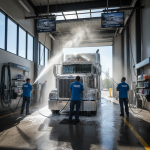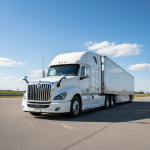In today’s fast-paced retail and fleet truck wash industry, operations face numerous challenges that can hinder their efficiency and profitability. From managing high volume traffic to meeting rigorous cleaning standards, these businesses must navigate a complex landscape to ensure the smooth operation of their wash facilities.
One of the key challenges faced by retail and fleet truck wash operations is the need to handle a significant influx of vehicles efficiently. These facilities often experience heavy traffic, with trucks and trailers lining up for cleaning services. This requires effective queuing systems and speedy turnaround times to avoid long waiting times and dissatisfied customers.
Moreover, meeting strict cleaning standards is paramount for retail and fleet truck wash operations. Trucks accumulate dirt, grime, and various contaminants from the road, making thorough cleaning essential. However, achieving consistently outstanding cleaning results while balancing time and resource constraints can be an ongoing challenge for these businesses.
Additionally, keeping up with the latest industry trends and technologies is crucial for retail and fleet truck wash operations to remain competitive. From eco-friendly cleaning techniques to adopting automation systems, staying ahead of the curve can help enhance efficiency and customer satisfaction.
Navigating the common challenges in the retail and fleet truck wash industry requires careful planning, innovative solutions, and a keen eye for detail. By effectively addressing these challenges, wash operations can stand out amidst the competition and provide top-notch services to their customers.
The importance of maintaining clean trucks
Maintaining clean trucks is crucial for the success of any retail or fleet truck wash operation. A well-maintained and clean truck not only enhances the company’s image but also contributes to the overall efficiency and safety of the vehicle. Dirt, grime, and contaminants that accumulate on the surface of a truck can negatively impact its performance, leading to increased fuel consumption, reduced visibility, and even potential mechanical issues.
Moreover, clean trucks are essential for compliance with various environmental regulations and industry standards. Strict guidelines are in place to ensure that trucks are properly cleaned, reducing the risk of polluting the environment and posing a hazard to other road users. By prioritizing truck cleanliness, retail and fleet wash operations demonstrate their commitment to environmental responsibility and customer satisfaction.
Regular truck washing also helps extend the lifespan of the vehicle by protecting its exterior from the damaging effects of environmental factors such as salt, UV rays, and harsh weather conditions. A well-maintained truck is less prone to premature wear and tear, leading to reduced maintenance costs and a longer operational life. This, in turn, can contribute to the overall profitability and sustainability of the truck wash business.
Common challenges faced by retail truck wash operations
One of the primary challenges faced by retail truck wash operations is the need to handle a high volume of traffic efficiently. Retail truck wash facilities often experience a surge of customers during peak hours, with trucks and trailers lining up for cleaning services. This can lead to long wait times, customer frustration, and potential loss of business.
To address this challenge, retail truck wash operators must implement effective queuing systems and streamline their cleaning processes. This may involve adopting advanced scheduling software, optimizing workflow, and investing in automated or semi-automated wash equipment to increase throughput and reduce turnaround times. Effective communication with customers, providing accurate wait time estimates, and offering alternative options (such as express or pre-booking services) can also help mitigate the impact of high-volume traffic.
Another significant challenge for retail truck wash operations is maintaining consistently high cleaning standards. Trucks accumulate a wide range of contaminants, including dirt, grease, and road salt, which can be difficult to remove completely. Achieving a thorough and uniform clean across all vehicles, while balancing time and resource constraints, requires a high level of attention to detail and a well-trained workforce.
To address this challenge, retail truck wash operators must invest in comprehensive staff training programs, implement rigorous quality control measures, and continuously evaluate their cleaning processes. Adopting advanced cleaning technologies, such as high-pressure washing systems and specialized detergents, can also enhance the effectiveness and efficiency of the cleaning process.
Retail truck wash operations must also navigate the complexities of meeting various regulatory requirements, including environmental regulations, safety standards, and labor laws. Compliance with these regulations can be time-consuming and resource-intensive, requiring careful planning, documentation, and ongoing monitoring.
To ensure compliance, retail truck wash operators must stay up-to-date with the latest industry regulations, invest in necessary equipment and infrastructure, and establish robust policies and procedures. Collaboration with regulatory authorities and industry associations can also provide valuable guidance and support in navigating these compliance challenges.

Common challenges faced by fleet truck wash operations
Fleet truck wash operations face unique challenges that differ from those encountered by retail truck wash facilities. One of the primary challenges is the need to maintain a high level of efficiency and consistency across a large number of vehicles, often with varying cleaning requirements and schedules.
Fleet operators must develop robust scheduling and coordination systems to ensure that their trucks are cleaned on time, without disrupting the overall operations of the fleet. This may involve implementing advanced fleet management software, optimizing routing and scheduling, and effectively communicating with drivers and maintenance teams.
Another significant challenge for fleet truck wash operations is the need to handle a diverse range of vehicle types and sizes. From small delivery vans to large tractor-trailers, each vehicle may require specialized cleaning equipment, detergents, and techniques. Ensuring that the wash facility is equipped to handle this variety of vehicles can be a complex and costly endeavor.
To address this challenge, fleet truck wash operators must invest in versatile and adaptable cleaning equipment, train their staff in handling different vehicle types, and maintain a comprehensive inventory of cleaning supplies. Adopting modular or customizable wash systems can also enhance the facility’s ability to accommodate a wide range of vehicle sizes and configurations.
Additionally, fleet truck wash operations face the challenge of maintaining consistent cleaning quality across all vehicles, regardless of their condition or the frequency of cleaning. Ensuring that every truck in the fleet is thoroughly cleaned and meets the required standards is critical for maintaining the company’s reputation, compliance with industry regulations, and the overall safety and performance of the fleet.
To achieve this, fleet truck wash operators must implement rigorous quality control measures, such as regular inspections, standardized cleaning protocols, and comprehensive staff training. Leveraging data-driven insights and performance metrics can also help identify areas for improvement and drive continuous optimization of the cleaning processes.
Environmental regulations and their impact on truck wash operations
Truck wash operations, both retail and fleet, are subject to a range of environmental regulations that have a significant impact on their operations. These regulations are designed to mitigate the environmental impact of the truck washing industry, ensuring the responsible management of water usage, wastewater discharge, and the disposal of hazardous materials.
One of the primary environmental regulations that truck wash operations must comply with is the Clean Water Act (CWA) and its associated regulations. The CWA sets strict guidelines for the treatment and disposal of wastewater generated during the truck washing process, requiring truck wash facilities to implement water reclamation and recycling systems to minimize their water consumption and reduce the discharge of pollutants into local waterways.
Compliance with the CWA can be a significant challenge for truck wash operations, as it often requires significant capital investments in advanced wastewater treatment technologies, such as oil-water separators, filtration systems, and water recycling equipment. Failure to comply with these regulations can result in hefty fines and legal penalties, as well as reputational damage for the business.
In addition to water-related regulations, truck wash operations must also adhere to rules governing the handling and disposal of hazardous materials, such as used oil, solvents, and detergents. These materials, if not properly managed, can pose a threat to the environment and human health, leading to strict regulatory oversight and the potential for costly remediation efforts.
To address these environmental challenges, truck wash operators must invest in comprehensive training for their staff, implement robust waste management protocols, and collaborate with regulatory authorities and industry associations to stay informed about the latest requirements and best practices. Adopting eco-friendly cleaning solutions and sustainable business practices can also help truck wash operations mitigate their environmental impact and demonstrate their commitment to environmental stewardship.
Solutions to overcome challenges in retail truck wash operations
To address the common challenges faced by retail truck wash operations, a multifaceted approach is required, involving a combination of operational improvements, technological advancements, and strategic planning.
One effective solution to handle high-volume traffic is the implementation of advanced scheduling and queuing systems. Retail truck wash operators can leverage digital platforms and mobile applications to allow customers to pre-book their cleaning services, reducing the need for on-site queuing and improving overall throughput. These systems can also provide real-time updates on wait times, enabling customers to make informed decisions and manage their expectations.
Automating and streamlining the cleaning process can also significantly enhance the efficiency of retail truck wash operations. Investing in state-of-the-art wash equipment, such as high-pressure washing systems, automated brushes, and advanced drying technologies, can help reduce labor costs, improve cleaning consistency, and increase the overall turnaround time for each vehicle.
Effective staff training and development are also crucial for maintaining consistently high cleaning standards. Retail truck wash operators should invest in comprehensive training programs that cover proper cleaning techniques, equipment operation, and quality control measures. By empowering their workforce with the necessary skills and knowledge, they can ensure that each truck is cleaned to the highest standards, meeting or exceeding customer expectations.
To address the challenge of regulatory compliance, retail truck wash operators should establish robust policies and procedures that align with the latest industry regulations. This may include implementing water reclamation systems, proper hazardous waste management protocols, and comprehensive safety measures. Collaborating with regulatory authorities and industry associations can also provide valuable guidance and support in navigating the complex compliance landscape.
By implementing these solutions, retail truck wash operations can enhance their efficiency, maintain consistently high cleaning standards, and ensure compliance with environmental and safety regulations, ultimately positioning themselves for long-term success in the industry.

Solutions to overcome challenges in fleet truck wash operations
Fleet truck wash operations can overcome their unique challenges by leveraging a combination of technological advancements, operational optimization, and strategic partnerships.
One effective solution for managing the diverse range of vehicle types and sizes in a fleet is the adoption of modular or customizable wash systems. These systems are designed to be adaptable, allowing fleet truck wash operators to configure their cleaning equipment to accommodate a wide variety of vehicle dimensions and cleaning requirements. This flexibility can help ensure that every truck in the fleet receives a thorough and consistent clean, regardless of its size or configuration.
Implementing advanced fleet management software can also be a game-changer for fleet truck wash operations. These digital platforms enable fleet operators to streamline their scheduling, routing, and communication processes, ensuring that trucks are cleaned on time and in accordance with their maintenance schedules. By integrating these systems with the wash facility’s operations, fleet truck wash operators can optimize their workflow, minimize downtime, and enhance overall efficiency.
Maintaining consistent cleaning quality across the entire fleet is another critical challenge that fleet truck wash operators must address. To achieve this, they can leverage data-driven insights and performance metrics to identify areas for improvement and continuously refine their cleaning processes. This may involve implementing advanced monitoring systems, conducting regular quality audits, and providing targeted training to their staff to ensure that every truck is cleaned to the highest standards.
Collaboration with industry partners, such as equipment manufacturers and chemical suppliers, can also be a valuable solution for fleet truck wash operations. By establishing strategic partnerships, they can gain access to the latest cleaning technologies, specialized detergents, and expert guidance on best practices. These partnerships can help fleet truck wash operators stay ahead of the curve, enhance their cleaning capabilities, and improve their overall operational efficiency.
By adopting these solutions, fleet truck wash operations can overcome the challenges of managing a diverse fleet, maintaining consistent cleaning quality, and optimizing their workflow, ultimately positioning themselves for long-term success and growth in the industry.
The role of technology in improving truck wash operations
The truck wash industry has witnessed a significant technological transformation in recent years, with the adoption of innovative solutions that have the potential to revolutionize the way retail and fleet truck wash operations are conducted.
One of the most impactful technological advancements in the industry is the integration of automation and robotics. Automated wash systems, equipped with high-pressure sprayers, rotating brushes, and advanced drying mechanisms, can significantly improve the efficiency and consistency of the cleaning process. These systems can handle a high volume of vehicles with minimal human intervention, reducing labor costs and ensuring a thorough and uniform clean across all trucks.
Another notable technological advancement is the use of data analytics and fleet management software. These digital platforms enable truck wash operators to gather and analyze real-time data on their operations, including customer flow, cleaning times, water usage, and equipment performance. By leveraging these insights, operators can make data-driven decisions to optimize their workflows, identify areas for improvement, and enhance the overall customer experience.
The integration of mobile and cloud-based technologies has also transformed the truck wash industry. Customers can now use mobile apps to pre-book their cleaning services, track the status of their vehicles, and even pay for the services remotely. This level of convenience and transparency can help improve customer satisfaction and loyalty, while also streamlining the overall operations of the wash facility.
Advancements in water reclamation and recycling technologies have also played a crucial role in improving the environmental sustainability of truck wash operations. By implementing advanced water treatment systems, truck wash facilities can significantly reduce their water consumption, minimize their environmental impact, and comply with increasingly stringent regulations.
The adoption of eco-friendly cleaning solutions and biodegradable detergents is another technological trend that is gaining traction in the truck wash industry. These innovative products not only enhance the cleaning effectiveness but also contribute to a more sustainable and environmentally conscious operation, appealing to the growing demand for green business practices among customers.
As the truck wash industry continues to evolve, the role of technology will become increasingly vital in driving efficiency, improving customer experience, and ensuring compliance with environmental regulations. By embracing these technological advancements, retail and fleet truck wash operations can position themselves for long-term success and growth in the industry.
Best practices for efficient and effective truck washing
Achieving efficient and effective truck washing requires a comprehensive approach that combines operational excellence, staff training, and a commitment to continuous improvement. By implementing best practices, retail and fleet truck wash operations can enhance their performance, improve customer satisfaction, and maintain a competitive edge in the industry.
One of the fundamental best practices for efficient truck washing is the implementation of a well-designed workflow and process optimization. This includes strategically positioning wash bays, optimizing the flow of vehicles, and streamlining the cleaning process to minimize downtime and maximize throughput. Adopting lean manufacturing principles, such as just-in-time production and continuous improvement, can help truck wash operations identify and eliminate wasteful practices, leading to greater efficiency and profitability.
Effective staff training and development are also critical for ensuring the consistent delivery of high-quality cleaning services. Truck wash operators should invest in comprehensive training programs that cover a wide range of topics, including proper cleaning techniques, equipment operation, customer service, and safety protocols. By empowering their workforce with the necessary skills and knowledge, truck wash operations can maintain consistently high cleaning standards and foster a culture of excellence.
Maintaining a well-maintained and properly calibrated fleet of cleaning equipment is another best practice for efficient and effective truck washing. Regular equipment maintenance, including the replacement of worn parts and the calibration of cleaning systems, can help ensure optimal performance, reduce downtime, and extend the lifespan of the equipment. Truck wash operators should also stay informed about the latest advancements in cleaning technologies and consider upgrading their equipment to take advantage of improved efficiency and cleaning capabilities.
Effective communication and customer engagement are also essential for achieving success in the truck wash industry. Truck wash operators should strive to provide transparent and responsive customer service, keeping customers informed about wait times, service offerings, and any changes or updates to the facility. Implementing customer feedback mechanisms, such as surveys and review platforms, can help truck wash operations identify areas for improvement and enhance the overall customer experience.
Finally, a commitment to continuous improvement and innovation is a hallmark of the most successful truck wash operations. By constantly monitoring industry trends, analyzing performance data, and seeking out new technologies and best practices, truck wash operators can stay ahead of the curve and adapt to the evolving needs of their customers. This mindset of continuous improvement can help truck wash operations maintain their competitive edge, drive long-term growth, and solidify their reputation as industry leaders.

Conclusion: The future of truck wash operations in the industry
As the truck wash industry continues to evolve, the future of retail and fleet truck wash operations holds both challenges and exciting opportunities. The ability to adapt to changing market conditions, embrace technological advancements, and prioritize sustainability will be the key factors that determine the long-term success and growth of these businesses.
One of the most significant trends shaping the future of truck wash operations is the increasing focus on environmental sustainability. With stricter regulations and growing consumer demand for eco-friendly practices, truck wash operators must prioritize the adoption of water-saving technologies, the use of biodegradable cleaning solutions, and the implementation of comprehensive waste management systems. By demonstrating their commitment to environmental stewardship, truck wash operations can position themselves as responsible industry leaders and appeal to a growing segment of environmentally conscious customers.
The integration of advanced technologies, such as automation, data analytics, and fleet management software, will also play a pivotal role in the future of truck wash operations. These digital solutions have the potential to enhance efficiency, improve customer experience, and drive continuous optimization of the cleaning process. Truck wash operators who embrace these technological advancements and leverage the insights they provide will be better equipped to navigate the industry’s challenges and capitalize on emerging opportunities.
Additionally, the growing emphasis on customer convenience and personalized service will be a key factor in shaping the future of truck wash operations. Customers increasingly expect a seamless and hassle-free experience, from pre-booking services to real-time updates and contactless payment options. Truck wash operators who can adapt to these evolving customer preferences and provide a superior level of service will be well-positioned to attract and retain a loyal customer base.
As the truck wash industry continues to evolve, the most successful retail and fleet truck wash operations will be those that can strike a balance between operational efficiency, environmental sustainability, and customer-centric innovation. By embracing these critical elements, truck wash businesses can position themselves for long-term growth, solidify their reputation as industry leaders, and capitalize on the exciting opportunities that lie ahead in the ever-changing landscape of the truck wash industry.



